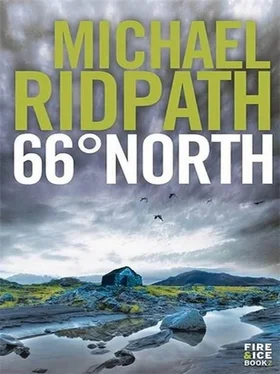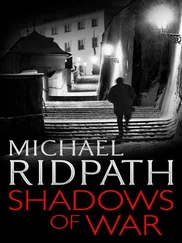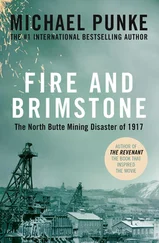Benedikt’s adult son, Jóhannes, had stopped by the house later that evening, and found his father lying in the hallway, dead.
Unsurprisingly, a major investigation was launched, led by one Inspector Snorri Gudmundsson, the current Big Salmon himself. It was thorough, boy was it thorough. Because of the snow, very few people were out and about, and those that were couldn’t see anything. The only person identified near the house at the time acting suspiciously was a fourteen-year-old schoolboy. He claimed he was trying to find shelter to light a cigarette. Nothing Snorri could do would shake him from this story.
Forensics produced nothing, although since the case was twenty-five years old the report was much less detailed than Magnus was used to. There were no signs of a break-in, implying perhaps that Benedikt knew his attacker. There were a couple of footprints in the hallway, which was slightly unusual. In Iceland guests would always take off their shoes when they entered a house. Size forty-three. Which was about nine in the US system, Magnus guessed. About average for a man. If, of course, they belonged to the murderer.
The investigation got nowhere, but that wasn’t for want of trying. Snorri was an energetic investigator, and Magnus could guess the pressure he was under. The file was bursting with interviews, including one with the famous writer Halldór Laxness, Magnus noticed. Benedikt had no real enemies, but any rivals were interviewed and alibis checked. There was one notoriously sensitive fellow writer whose most recent book Benedikt had reviewed with heavy irony. The writer claimed he was at home alone reading all evening. Despite his lack of an alibi, and all Snorri’s efforts, there was no proof linking him to the murder.
It turned out Benedikt had had a brain tumour. There was an interview with a doctor at the hospital who had told Benedikt in February of that year that he had only six months to live. Timing a little out, thought Magnus, but not by much. Questions had been asked, but none of Benedikt’s friends or children seemed to know anything about it. He had kept the knowledge to himself.
The tumour must have been quite advanced when he died. Magnus wished he had the pathologist’s report. It was pretty clear from the file that Benedikt had been stabbed, but the search for a knife with a three-inch blade had turned up nothing. With any luck the report would show up on Magnus’s desk in the next day or two.
Snorri had then begun to interview every burglar who had ever been arrested in Reykjavík; a major undertaking that had taken weeks. Magnus was amused to see that Baldur Jakobsson’s name appeared on the bottom of many of the reports of these interviews. There was no mention of any interviews with anyone at Bjarnarhöfn. Why should there be? It was decades since Benedikt had lived at Hraun.
Snorri could not find a single hard lead. No suspects, nothing. Twenty-five years on, the murder of Benedikt Jóhannesson was still a complete mystery.
Magnus tucked the file away in his briefcase, and left the café. There was one more thing he wanted to check about his grandfather.
The National Registry was right on Borgartún. As befitted the very heart of the national bureaucracy, it was the scruffiest building on the street. Magnus had some difficulties with the clerk, who regarded his Boston Police Department badge with scepticism. He still hadn’t got himself an official Reykjavík Metropolitan Police badge, and he wouldn’t until he graduated from the police college. However, the clerk smiled when he mentioned that he was working with Vigdís Audarsdóttir, whom she clearly knew, gave Vigdís a quick call at police headquarters, and then asked Magnus what he wanted.
It took her only a moment to confirm what Magnus had suspected. Although Hallgrímur Gunnarsson of Bjarnarhöfn in Helgafellssveit had a kennitala, or national identity number, he had never been issued with a passport.
Björn ordered himself a second cup of coffee from the counter. This place was expensive. You’d never pay that much for a cup of coffee in Grundarfjördur.
He took it back to the table he had been occupying for the last twenty minutes. He was in the café in the upper reaches of the Pearl, a grey bulbous building squatting on top of Reykjavík’s hot-water storage tanks. It was situated at the summit of a small hill overlooking the whole city. It had been chosen because the approach road up to the building from the main thoroughfare was open and empty. Impossible not to spot a car following you.
It had taken him a little longer to reach Reykjavík in the pickup than on his motorbike, but Björn had driven fast. He tended to drive fast when he was tense. And there was no doubt he was tense. He would soon be face-to-face with Harpa. He hoped he had the courage to see his plan through.
Through the broad expanse of glass he looked west out across to the sea, itself gleaming a pearly grey in the sunshine. In the foreground was the irregular crossed triangle of the runways of the Reykjavík City Airfield. And the spot where Björn had dumped Gabríel Örn’s body nine months before.
But before he faced Harpa, Björn had some people to see. Where the hell were they?
‘Björn! How’s it going?’
Björn felt a heavy pat on his shoulder, and turned to see Sindri and behind him the neat figure of Ísak.
‘Let me get some coffee,’ said Sindri. ‘We have a lot to talk about.’
‘WERE YOU FOLLOWED?’ Sindri asked Björn as he sat down with his coffee.
‘No. You were right, this is a good place.’
‘We’ve got to make sure the cops don’t see us together,’ said Sindri.
‘I don’t understand what Ísak’s doing here,’ said Björn, frowning.
‘He just arrived back in Iceland yesterday,’ said Sindri.
‘Why?’
‘The British police might be on to me,’ Ísak said. ‘One of them came to my house to interview me. Wanted to know whether it was me who had been asking Óskar’s neighbours where he lived. She didn’t push it, but she’s suspicious. So I thought I’d come back here. Make it that bit more difficult for her.’
‘The cops here are asking awkward questions too,’ Sindri said. ‘There’s a big red-haired bastard called Magnús who won’t leave us alone. Some kind of American.’
‘I told my mother things were getting on top of me and I needed to get away for a few days,’ Ísak said. ‘Go camping in the hills. Sort myself out. I borrowed her car, she’s too ill to drive it these days.’
‘Did she believe you?’
‘She knew I was acting a bit weird, but she didn’t know why and I didn’t tell her. That’s the best way to deal with parents. Never explain. Keep them guessing.’ Ísak sipped his coffee and glanced at Björn. ‘So, Sindri tells me there’s a problem with Harpa?’
Björn didn’t like Ísak, never had. He was too cool. Too self-possessed for a student. Sindri wore his passion on his sleeve. Ísak’s was in there, it had to be to do the things they were doing, but it was a cool, calculated determination to follow a carefully worked out plan. It was as if Ísak was trying to win an intellectual argument and willing to go to any lengths to prove himself right. Björn wasn’t trying to prove anything: he was just bringing justice upon those people who had destroyed his life and the lives of so many other Icelanders.
‘Yes,’ he said, turning to Sindri. ‘She’s got this idea that we, or rather you, Sindri, are behind the shooting of Óskar and Lister. She spoke to the kid Frikki the other day; he was the one who put the idea in her head. She suspected me as well, but she seems to believe my innocence now. Anyway, she wants to go to the police.’
Читать дальше












